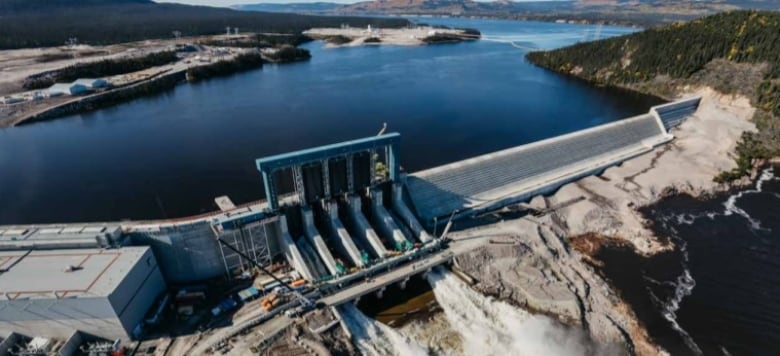The federal and provincial governments have struck a deal to stave off stark financial consequences of the Muskrat Falls hydroelectrc project for ratepayers in Newfoundland and Labrador, but provided few details Wednesday as to what that deal contains.
Prime Minister Justin Trudeau and Premier Andrew Furey made the joint announcement before media at Confederation Building in St. John’s on Wednesday, as a handful of protesters stood outside the legislature to voice their opposition to any further hydroelectric development in Labrador.
Trudeau said following an “excellent meeting” Wednesday morning, an agreement had been reached to ensure “financial sustainability” of the Muskrat Falls project, while protecting ratepayers’ power bills.
Sharp increases to electricity bills, as a consequence of the overbudget and behind schedule Muskrat Falls project, have loomed over the province for years.
The prime minister did not provide details of the deal, saying there would be a technical briefing following the announcement to explain details.
CBC News has learned the deal is a multibillion-dollar agreement that will see the federal government buy part of the project as part of an overall financial restructuring of Muskrat Falls.
The entire announcement lasted about eight minutes, with Trudeau saying questions from media would have to wait until an afternoon announcement on child care.
“Today is indeed an historic day for Newfoundland and Labrador,” said Furey, calling the project the “number one issue” facing people of the province worried about how to afford skyrocketing electricity bills.
Without such a deal, once Muskrat Falls is commissioned in the fall and power begins to fully flow to the grid, electricity ratepayers in Newfoundland and Labrador would be on the hook to pay for it. That would cause power rates to balloon, from 13 cents per kilowatt-hour to just under 23 cents for ratepayers in a province already struggling with massive debts.
The final cost for Muskrat Falls is expected to land at around $13 billion, a far cry from its initial $6.2-billion price tag in 2010.
As costs have soared, efforts to mitigate the taxpayer burden to pay for the project have occupied significant political time at the provincial and federal levels. Ottawa has increased its loan guarantees in the past, and at the end of 2020, deferred $844 million in provincial payments and appointed energy expert Serge Dupont as lead negotiator on the file.

The project was billed as a clean energy project to supply Newfoundland and Labrador, Nova Scotia and potentially beyond, but it has been dogged by complications since its inception.
It has been subject to a provincial inquiry that produced a scathing report about its management, and the Crown corporation created to oversee the project, Nalcor Energy, is in the midst of being dismantled as a cost-saving measure.
Innu Nation concerns
Ahead of Wednesday’s press conference, the Innu Nation outlined its concerns about Trudeau’s visit to St. John’s.
The Innu Nation agreed to the Muskrat Falls project at its inception but said in a media release it had not been informed ahead of time about what the announcement will be, and they’re worried about its ramifications.
“The benefits promised to us in our agreement with Nalcor cannot be sacrificed,” the statement said.

A land claims agreement between the Innu Nation and the federal and provincial governments is not yet finalized, and as federal election speculation ramps up, the nation said it wants a treaty resolution to become an election issue.
Such a treaty would include a right for Innu consent on future hydroelectric projects in Labrador, the press release said, a departure from the past Churchill Falls project which destroyed the traditional nomadic Innu way of life in the 1960s.
“Our land is not a commodity to be sold to solve N.L.’s economic crisis,” the statement said.







More Stories
Honda to invest $15B to build four new EV plants in Ontario | CBC News
Trudeau, Ford make electric vehicle announcement
TikTok vows to sue over potential U.S. ban. What’s the legal outlook? – National | Globalnews.ca